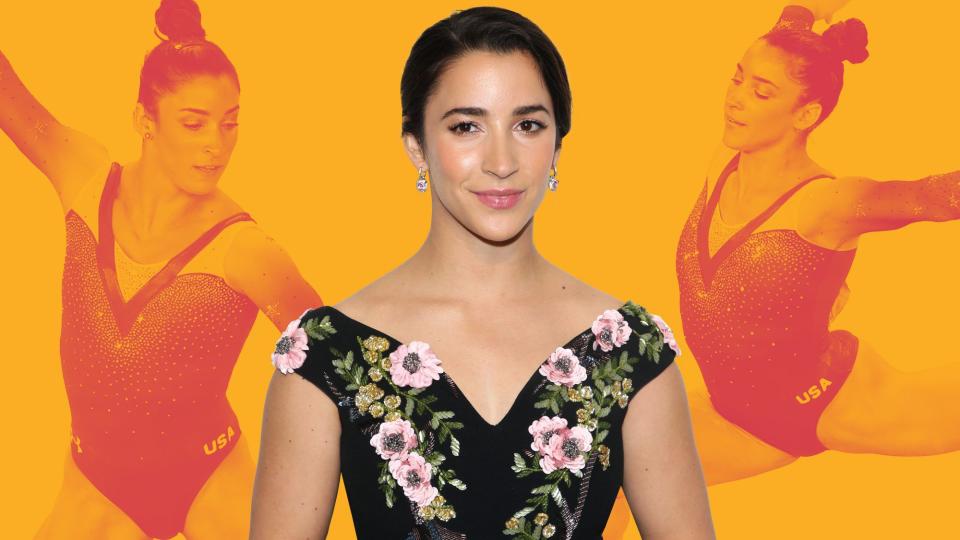Aly Raisman Says Her 'Body Has Never Felt the Same' Since the 2016 Olympics
In the years leading up to the 2012 and 2016 Summer Olympics — and during the Games themselves — gymnast Aly Raisman remembers spending her days doing just three things: eating, sleeping, and training. "It was really exhausting, and it was kind of like everything is surrounded around gymnastics," she tells Shape. "There's a lot of pressure, and I just remember having anxiety all the time."
The rigorous regimen was basically devoid of rest days, too. Throughout the Games, Raisman says she and her teammates would typically practice twice a day, and on occasion, they'd have just one practice — which was considered a "day-off." Cat naps were Raisman's main recovery tool, but giving herself all the R&R she needed between back-to-back competitions and practices wasn't easy. "When you're [physically] tired, sometimes you get mentally tired as well," she says. "You're not as confident, and you just don't really feel like yourself. I think one of the things that's not talked about a lot is that one of the hardest parts is just feeling rested and getting ready for the competition."
Compounding the problem was that Raisman didn't have adequate resources to take care of her mental health, and she didn't realize how much she was struggling with it, either, she explains. "I would get different treatments after workouts, but I didn't understand that I needed to take care of the mental part — not just icing my foot if I had an ankle injury," says the six-time Olympic medalist. "I think as more athletes speak up, the more it will create opportunities for other athletes to be supported [mentally], but there really wasn't much for us...I wish I had more of the tools that I have now." (One athlete who's currently voicing their concerns: Naomi Osaka.)

Getty Images
Even though the end of the Games always came with a big sigh of relief and some downtime, Raisman, who officially retired from gymnastics in 2020, says her burnout still hasn't completely disappeared. "I still feel like ever since I started training again for the 2016 Olympics, my body has never felt the same," she says. "I think I was so busy — and there were so many other factors besides the amount of training that I did — and so now I'm just trying to give myself time to recover and rest. It's definitely a process." (In 2017, Raisman and other gymnasts came forward revealing they had been sexually abused by former USA Gymnastics team doctor Larry Nassar.)
Nowadays, Raisman takes it easy on the fitness front, focusing on stretching, taking walks at sunset, and on the rare occasions she chooses to workout, doing Pilates — a 180-degree turn from the grueling routine of her gymnastics career. "I'm not able to do [Pilates] every day, as much as I would like to, just because I don't physically have the stamina to do it," she says. "But Pilates has really helped me with my workouts and even mentally, too, because I like how I can focus on different parts of my body, and it helps me feel more strong and confident."
Even though Raisman didn't get all of the support she needed throughout her gymnastics career, she's making sure the next generation does. This summer, she's serving as the Gymnastics Program Designer at Woodward Camp, where she's coaching young athletes and helping to reimagine the gymnastics program. "It's been really fun and awesome to be able to interact with the kids — some of them remind me of myself when I was younger," says Raisman. Outside the sport, Raisman is also teaming up with Olay, which is inspiring 1,000 girls to explore STEM careers with Million Women Mentors, to spread the word about the importance of mentorship. "I'm very inspired by people who are trying to change the world, and I think having the opportunity to let more women be involved in that world is so crucial," she adds.
Also on Raisman's agenda: Figuring out who she is outside of gymnastics, how she can become the best version of herself, and the exact practices that will give her the energy and de-stressing she needs, she explains. The Olympian is still working on the first two existential questions, but so far, turning off the TV and reading in the bath before bedtime instead, cutting sugar out of her diet, and spending time with her pup Mylo have done the trick for the latter. "I think when I feel more relaxed, I'm more myself, so I'm just trying to figure out how to get there on a more consistent basis."

